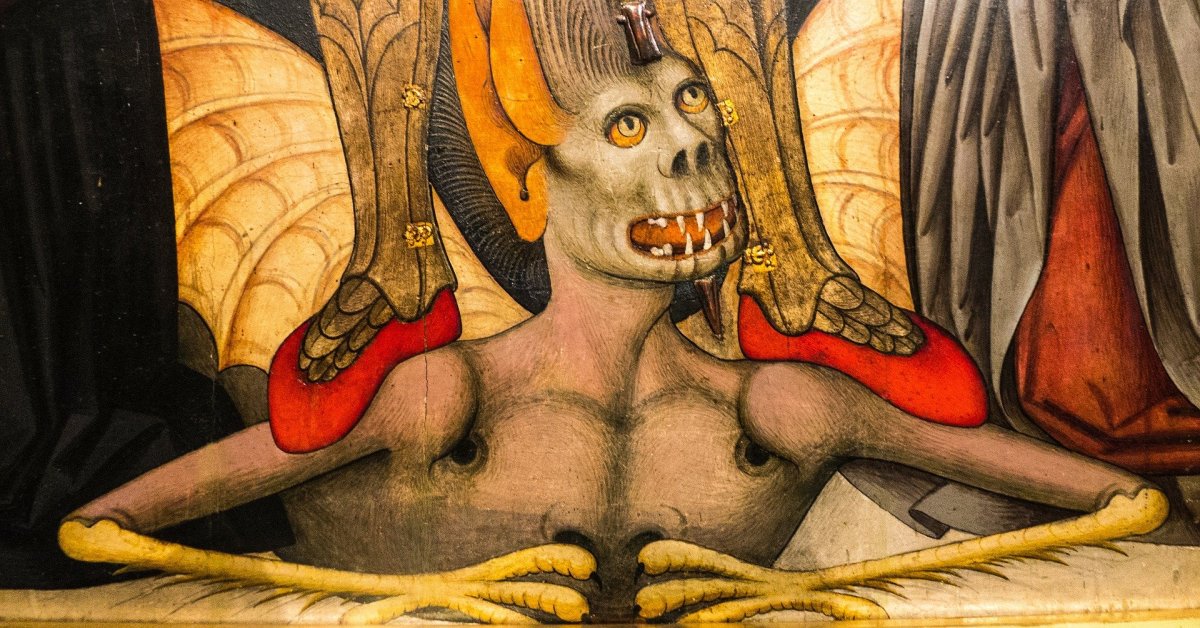Why Does the Devil Contrive to Acquire Human Souls?: (A Speculative Essay)

The knowledge of how to build a nest in a tree, how to fly to the wintering place, how to perform the mating dance -- all of this information is stored in the reservoirs of the bird's instinctual brain. But human beings, sensing how much flexibility they might need in meeting new situations, decided to store this sort of knowledge outside the instinctual system; they stored it in stories. Stories, the -- fairy stories, legends, myths, hearth stories -- amount to a reservoir where we keep new ways of responding that we can adapt when the conventional and current ways wear out.
Robert Bly from Iron John: A Book About Men. Addison-Wesley, 1990. pp.x-xi
-----------------------------------------------------------------------------------------------------------
The question we're going to examine today is: Why does the Devil purchase human souls and what does he do with them? Does he keep them jars to just collect and look at? Does he trade them with other demonic friends from other planets with sentient life, and trade them like baseball cards? What does he do with them?
As you know, this kind of thing (Satan buying human souls) pops up in popular culture. We get a glimpse of it every now and again in certain Hollywood films, t.v. movies, episodes of sitcoms, and the like. These days, this idea is usually treated comedically in these mediums. In previous periods, this idea of Satan buying human souls, was treated more seriously in popular fiction of all kinds. But I suppose that's neither here nor there.
For the purposes of this essay, I am going to assume that the idea of Satan buying human souls, has a basis in the ancient literary/mythological tradition of Christianity and the Bible.
Let's approach the question this way...
Suppose I am a Mafioso loan shark, and you (whoever 'you' may be) are a medium-sized business owner. Let's say you engage in expensive extracurricular activities (gambling, heroin, visiting prostitutes, etc). You come to me, the Mafioso loan shark, for a loan, which I gladly supply. I am going to give you the loan at a rate of interest, which I don't expect you to be able to maintain. In fact, I'm hoping you cannot.
What I, the Mafioso loan shark, need you, the medium-sized business owner, to do is give up, default under the pressure. That way, instead of killing you I can simply take either a controlling interest or the whole of your business. That's what I really wanted all along. I need it.
I need to be involved with as many legal businesses as possible, so that I can show the IRS that I am a "legitimate businessman." You see, I cannot write extortion, prostitution, drug dealing, and strong-arm as sources of income on my tax form. If I can pass myself off as a legitimate businessman, maybe the authorities won't bother me so much --- its worth a try.
So, does the Devil, like the Mafioso with the businesses, need human souls for the purpose of pulling off some kind of deception? Does the Devil (and his crew?) want to try to.... pass himself off as human?
Who does he expect to be able to deceive?
Hold that thought!
-------------------------------------------------------------------------------------------------------
In the classic novel by Mario Puzo, The Godfather, there is a scene between the Mob boss, Don Vito Corleone, and his oldest son, Santino (Sonny). The Don had been raising Santino to be "respectable," but the young man had been caught committing his very first felony, the hijacking of a truck with some friends and cohorts. The Don is disappointed in his son; mind you, not because of the illegality of the act, and not because of its immorality or anything sentimental like that. The Don believes Santino's risk-benefit analysis had been faulty --- too much risk for too little reward.
Don Corleone takes a few minutes to scold Santino about this. Then the Don says this to Santino: "Don't you want to finish school? Don't you want to be a lawyer? A lawyer can steal more money with a briefcase than a thousand men with guns and masks."
This is literally true, of course (1).
That is the issue, of course. Vito Corleone is saying: You can do what I do, son, but just do it legally and with a law degree, why don't you?
Don Vito's meaning becomes clearer, in my opinion, in another novel by Mario Puzo, The Last Don, which was also a made for television movie special starring Danny Aiello, Jason Gedrick, and Joe Mantegna. The Godfather is about the Corleones; and the Last Don concerns the Clericuzios.
In The Last Don, there is a scene in which Don Clericuzio holds a meeting with the inner circle of his crime family, which happens to be his biological sons and his nephew. What Don Clericuzio wants to do is to more and more distance the organization, the "Family," from street crime, all those classic Mafia enterprises at which the Clericuzios excelled at to become the most powerful Mafia organization in America.
Don Clericuzio wants to get out of drugs, prostitution, unions, extortion, and the like, to focus almost exclusively on gambling. The Clericuzios have a project going to get gambling legalized in all fifty states of America; this will mean billions in annual income for the Clericuzio clan. At one point during this meeting (and in the television movie) Don Clericuzio says, "Twenty, thirty years from now we'll all disappear into the lawful world and enjoy our wealth without fear."
Thus Don Clericuzio makes explicit that which Don Corleone hinted at, and which was made explicit in the two subsequent "Godfather" novels written by Mark Weingartner.
What we're reading here is the desire of Mafia heads to attach themselves to the legitimate American elite power structure, because it is much better and more secure than being constantly hunted as a "criminal." Social assimilation is seen as the most sensible path to insure the safety and prosperity of subsequent generations of their families. The Mafia thing turns out to be a means to an end. This is a theme running throughout Mario Puzo's Mafia novels.
Now then, this methodology we looked at earlier, whereby a Mafioso loan shark captures legitimate businesses in the way I already described, seems to be one of the techniques whose ultimate aim is rehabilitation through social assimilation.
Does this mean that the Devil and his minions are using the human souls they capture for a project whose ultimate aim is rehabilitation through social assimilation with the ranks of Heaven? And if this is true, do the demons hope that this will get Heaven to stop hunting them? Furthermore, if this is true, does it follow that the demons are doing this for the long-term welfare of their descendants?
But whatever happened to the idea that it was "better to rule in Hell than serve in Heaven"? Perhaps the Devil and his supporters found out that that position was just bunk, practically untenable, just as, perhaps, the most powerful Mafia boss, would rather have social legitimacy and quiet political power rather than ruling the criminal world.
Of course not every mafioso approves of the project of rehabilitation through social assimilation. They prefer to keep on living like cowboys. Could there be a similar schism of purpose among the demons?
-------------------------------------------------------------------------------------------------------------
Why would the Devil seek reconciliation with Heaven, when he was evicted from the place because of his pride?
This is the basic thrust of the Christian tradition, as I understand it. However, in the Muslim tradition, we find that Iblis (Shaytan) was evicted from Heaven because he refused to bow down to God's created being of humankind. The Devil loved God so much that he could not bear to bow down to anyone but God, Allah.
http://en.wikipedia.org/wiki/Iblis
It could be that the Devil never stopped loving God; though perhaps it is a kind of "fatal attraction" love.
The Temptation of Jesus
And speaking of "Fatal Attraction," let us quickly consider this sub-genre of film: the femme fatal is looking for the perfect man, and she has found him! The fact that he is happily married is but a minor detail. Off hand I'm thinking about the 1980 film, The Babysitter with Stephanie Zimbalist and the more recent film, Obsessed with Ali Larter.
The target of their "fatal attraction" are men they consider to be "perfect." The interesting thing, though, is that at some point the women always try to taint the reputation of their targeted men with their wives. The fatal attractors seek to put a wedge between the targeted men and their wives, by falsely (though not always falsely) planting the suggestion with the wives that the targeted men had made advances toward them, the fatal attractors, and perhaps did more than that!
The practical reason for this is quite straightforward, of course. If the fatal attractors can break up the marriages of the wives and their targeted men, then they, the fatal attractors will have these perfect men all for themselves, or so they most fervently hope.
But I believe there is another reason. I think that the fatally attracting women do not feel worthy of the "perfect" men they target. Because of this, I think, the fatal attractors feel the powerful need to morally compromise the men of their dreams, so that they, the femme fatales, don't feel so low looking so far up -- on a figurative, moral level -- at the objects of their desire.
I mention all of this because, to my way of thinking, this is the only way that Satan's attempt to compromise Jesus makes any sense.
Remember, in the Christian tradition Jesus is supposed to be God incarnate. What would ever possess the Devil to think that he could tempt God Almighty (Remember when Jesus spent forty days and forty nights in the desert and the Devil came to tempt him?)?
It could be the case that the Devil believed that God, incarnated in human flesh was in a weakened state and thus vulnerable to his charms. It could very well be that the Devil does indeed want to reconcile with God, but has the strong need to morally compromise "Him" in some way, so that the Lord could, somehow, sort of meet Satan "halfway," as it were.
You know, another tactic that the femme fatales use to try to cleave the targeted "perfect" man away from his wife or girlfriend, is to make moves to sully the reputation of the wife or girlfriend of the "perfect" man. The aim of the fatally attracting female is to demonstrate to her paramour that: "She is not good enough for you," or that "She can't love you like I can," and so on and so forth.
As weird as this sounds, something like this could very well be at work in Satan's zeal to corrupt humanity, and sort of turn to God and say, "See? I told you so!" Satan must have been pleased as punch with himself when he managed to get Adam and Eve kicked out of the Garden of Eden; but I'm sure he was disappointed when his project to get Job to curse God fell flat.
--------------------------------------------------------------------------------------------------------------
Another technique the fatally attracting woman may use to try to ensnare her man, is to assume some of the characteristics that her perfect man loves so much.
This is absolutely classic in psychopathic idealization films and novels. For example, though this may not have been made clear in the latest film version of "The Talented Mr. Ripley," but Patricia Highsmith's original novel makes it quite clear, it seems to me, that Tom Ripley tries to make himself be more like his idol, Dickie Greenleaf, in order to get said Mr. Greenleaf to like him better.
Tom Ripley was in love with Dickie; he had an obvious homosexual attraction to his idol, though such things were not openly stated in the 1950s, when Ms. Highsmith published this novel. Unfortunately for Tom (and especially for Dickie), young Mr. Greenleaf never did warm up to Tom, the way the latter had hoped; and therefore, Mr. Ripley eventually came to the psychopathic conclusion that the only way that he and Dickie could ever "be together," was that if he, Tom, killed his idol, Dickie.
This is how I read the novel, anyway. After Tom killed him, he continued the process of internalization and assimilation of Dickie's identity with his own, for both practical and personal reasons. The book is worth reading if you like literary crime fiction.
In any event, Tom never became delusional in any way, thinking that, "I am Dickie Greenleaf," or anything like that. Indeed, in order for the "relationship" to work, even on this abstracted and virtualized level, it was quite necessary, psychologically, for Tom to retain his sense of Tom(ness)... interacting with Dickie.
This psychological approach proved to be very influential, as you all know. Take a look at those psychopathic obsession movies; this psychological element of identity internalization and assimilation is essential.
You know a good way to think about this?
It seems to me that what Tom, and other such psychopathic characters in fiction (perhaps in real life too) are trying to do phenomenologically is reflected in a species found in the television series, Star Trek. I'm thinking specifically of Star Trek: Deep Space Nine. There is a character from a humanoid species known as the Trill. Jadzia Dax, the science officer aboard the Deep Space Nine station, is of the Trill.
For a select few of the Trill, when they come of age -- and if they are found to be intellectually and psychologically suitable -- are allowed to host a symbiot, a kind of mushy, brain-like intelligent and virtually immortal organism. A single one of these organisms may pass through dozens of lifetimes.
When a new candidate receives her symbiot, she retains her personality and character (there is absolutely no distortion of this), but she also has full access to the memories, likes and dislikes, personalities, and knowledge of the previous hosts of the symbiot.This is what I believe is going on, phenomenologically, with Tom and other such psychopathic characters in fiction (and perhaps in real life too).
But let's step back from this precipice, even though the very, very, very bad television movies or Hollywood films will even go so far as to suggest that the Devil is trying to kill God....
--------------------------------------------------------------------------------------------------------------
Now, I was saying that the psychotic femme fatale will resort to assuming the characteristics of the wife or girlfriend that her targeted "perfect man" seems to love so much. To take a very minor example, in the Stephanie Zimbalist film, The Baby Sitter, the eighteen year old femme fatale Zimbalist character, at one point when she is feeling confident that her mojo was working on her targeted, perfect man (William Shatner's character), she, Zimbalist, greets him wearing his wife's evening gown.
In this scene, Zimbalist was effectively trying to show Shatner, that she could play his wife's role better than his wife could! And so on and so forth.
This brings us back to the question of the souls. What does the Devil do with the human souls he acquires?
Well, I believe the Devil has a very similar purpose in mind.
Question: Even if that true (bizaare but true), how would the Devil use all of those human souls to do this? Surely he cannot "slip them on" like an evening gown, can he?
Oddly enough, we do get a clue, I think, as to how the Devil could use those souls.
There's a wonderful fantasy novel (one of a trilogy) by a talented young author, who usually does historical fiction, called David Anthony Durham. The first of the trilogy is called Acacia: The War with the Mein.
The fascinating thing about the book, for our purposes, is that it features what I think of as three kinds of immortality. One of these is reflected in a people called the Numrek. These are towering, Hulk-like men and women of inhuman strength, durability, and as it turns out, longevity.
The Numrek also turn out to be more than meets the eye, which, believe me, is formidable enough! They get their unnatural size, strength, and longevity from the fact that each individual houses multiple souls. This multiple-soul thing gives them much more than the fabled cat "nine lives" thing.
For example, in the world of Acacia, you could shoot a Numrek "dead," which would exhaust the strength of one of the souls he hosts in his body. He would fall down, "dead" for a moment; but then his other souls would, sort of, "pick up the slack," as it were; whereupon he would get up and rip you in half!
So, it could very well be that the Devil and his supporters are seeking to use the human souls they collect, for precisely the purpose of somehow, they hope, making themselves "more human," because this is what they think God loves best. And, as a matter of fact, this could very well be what is behind the folklore we hear concerning the mating of demons with humans. It could be part of a long-term demonic project of social integration and assimilation with human beings, who they believe God loves best -- much like the point of view of Mafia kingpin, Don Clericuzio, in The Last Don, when he declared, "Twenty, thirty years from now, we'll all disappear into the lawful world and enjoy our wealth without fear."
Thank you so much for reading. Ta-Ta!
Notes
1. See Johnston, David Cay. Perfectly Legal: The Covert Campaign To Rig Our Tax System To Benefit The Super RIch --- And Cheat Everybody Else. Portfolio, 2003. In the novel, The Godfather, Don Corleone's hope was that his oldest son, Santino, would get a law degree and the social legitimacy that comes with it to pull of the same kind of gangsterism that the Corleone Mafia Family pulled off with "a thousand men with guns and masks." In the novel, The Last Don, Don Clericuzio chose a different option for his oldest son, Giorgio. The Don sent him to an elite business school to learn how to basically do the same thing.








